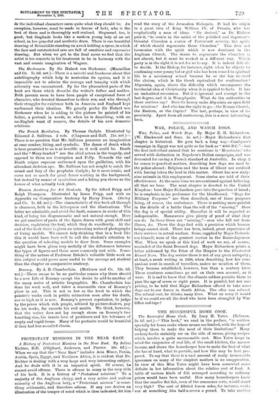PROTESTANT MISSIONS IN THE NEAR EAST.
A History of Protestant Missions in the Near East. By Julius Richter, D.D. (Oliphant, Anderson, and Ferrier. 10s. 6d.)-- When we say that the "Near East" includes Asia Minor, Persia, Arabia, Syria, Egypt, and Northern Africa, it is evident that Dr. Richter is dealing with a very large and very interesting subject. And he deals with it in an impartial spirit. Of course, he cannot avoid offence. There is offence to many in the very title of his book. It is a history of "Protestant missions." To a majority of the Anglican clergy, and a very active and zealous minority of the Anglican laity, a "Protestant mission" is some- thing schismatic, and therefore odious. If any one desires an illustration of the temper of mind which is thus indicated, let him read the story of the Jerusalem Bishopric. It had its origin in a great idea of King William IV. of Prussia, who was emphatically a man of ideas. "lie desired," as Dr. Richter puts it, "to create in the midst of the petrified and degenerate Oriental Churches a units.° of Protestant activity, the spirit of which should regenerate those Churches." This does net harmonise with the spirit which is now dominant in the Anglican Church. The desire to regenerate the Churches is not absent, but it must be worked in a different way. Whiels party is in the right it is not for us to say. It is indeed difilsult to decide. Is the Bishop, for instance, right when he objects to confirming some young lad or girl who has been roused to spiritual life in a missionary school because he or she has received the chrism, which is the Greek equivalent for confirmation ? Abyssinia, again, shows the difficulty which encompasses the territorial idea of Christianity when it is applied to facts. It has an undoubted succession. But it is ignorant and corrupt in the last degree, and it is Monophysite. What do the authorities in these matters say ? Does its heresy snake Abyssinia an open field for missions? And who has the right to go,—the Roman Church, the Eastern, or the Coptic? The last, perhaps, in view of its proximity. Apart from all controversy, this is a most interesting book.


































































 Previous page
Previous page